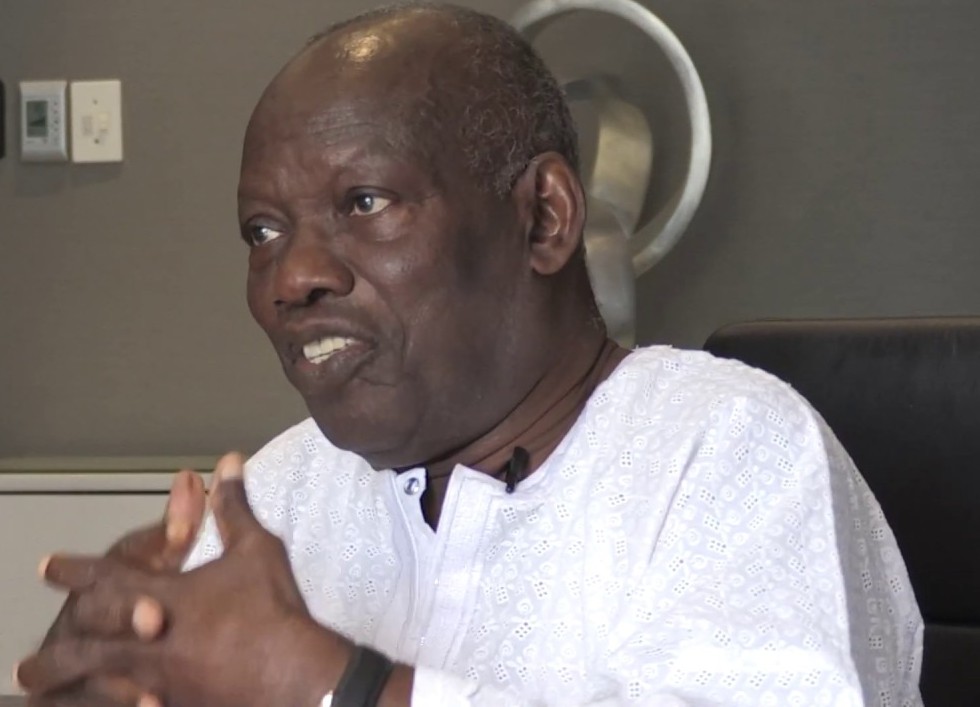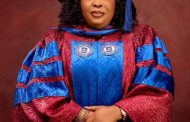By Adagbo ONOJA
The first part of this report focused on the very scholarly but explosive dimension Prof Okey Ibeanu raised regarding the moving the assessment of the electoral management body in its different configurations from the structural to the agentian dimension. It is potentially explosive because what is now known as INEC has been headed by colonial officers, Nigerian judges, academics and administrators. Surely, they all don’t look at the world from the same lenses and bringing their lenses under scrutiny might hold the key to the crisis of free and fair elections in Nigeria.
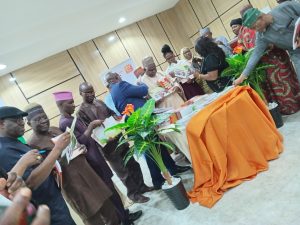
Book presentation in action
But Prof Ibeanu’s position was a synthesis of the views canvassed earlier that day at the public presentation of Electoral Management Bodies in Nigeria Since 1958. It is those views that this report focuses on but in no systematic order.
Director of the National Institute of Legislative and Democratic Studies (NILDS), Dr, Abubakar Suleiman welcomed the publication because, according to him, existing documentation falls short of a “a thorough account of the factors and dynamics that have shaped the transformation of the electoral management bodies in Nigeria, from what it was in the 1959 elections (which is the Electoral Commission of Nigeria, ECN), to the Federal Electoral Commission (FEDECO) was during the 1979 elections, to the National Electoral Commission of Nigeria (NECON) in 1993, and to the Independent National Electoral Commission (INEC) as we have come to know it since 1999 have largely been missing in previous works.”
He used the opportunity to showcase what the NILDS has similarly published viz “A Century of Lawmaking in Nigeria”; “40 Years of ECOWAS Governance”; “The National Assembly and Democratic Governance in Nigeria”; and “The Political Economy of Pandemics and Consequences of COVID-19 for Nigeria”, indicating the preparedness of the think tank of the legislative establishment in Nigeria with Electoral Hub, publishers of the book being presented. The DG’s statement stands for the section on goodwill messages, most of which stressed well known points about the imperative for credible elections in Nigeria. Alhaji Yusuf Dantalle, the National Chairman of the Inter-Party Advisory Council (IPAC) emphasised how elections constitute the life-wire of democracy, making a neutral, non-partisan and transparent election management body so crucial. His take is interesting because someone who sat near Intervention wondered how the ruling party at any one time is never a member or active player in IPAC. The People’s Democratic Party (PDP) was never an active player in IPAC when it was the ruling party between 1999 and 2015. So also the All Progressives Congress (APC) which is now the ruling party.
Of course, INEC Chairman, Prof Mahmud Yakubu sent a goodwill message delivered by Prof Abdullahi Zuru. He too stressed how the legitimacy of any government lies in the election that brought it into power, thereby making a free, fair, credible, transparent and verifiable outcome crucial. He assured the nation and Edo State that INEC is doing everything it takes for election ahead in the state to take place as scheduled.
Dr. Husseini Abdu, Country Director of CARE drew attention to a culture of a new electoral law, for example, at every election cycle. He also lamented the isolation of the electoral management body in critiquing the conduct of elections, leaving out the security agencies, the judiciary and managers of data in Nigeria. His contention is that we cannot get it right if we cannot get it right in each of these institutional levels. His sense of the inclusion of women is that it is low.
Barrister Festus Okoye, an immediate past INEC National Commissioner took advantage of his empirical insights into the dynamics of elections in recent Nigeria to argue that Nigeria has a culture of amending the electoral law and even other laws as soon as they confront challenges on the field. It is such that the laws have even become too bulky. His second point is that INEC must, on no condition, rely on the mood of the nation as opposed to the interpretation of the law in dealing with fallouts from the conduct of an election. For it to do so is to devote more time to managing anger instead of managing an election. Third point from him is that the guidelines, regulations and the laws do not constitute the starting point of the election process. Agitators, party officials and sundry stakeholders do, he says, citing what politicians do to corpers as an example. What they do to corpers is such that parents now approach INEC officials on election day to say their son or daughter is the only one and they would not accept their participation as irregular staffers to INEC. Okoye is sure that some of the stakeholders simply have no knowledge of election dynamics. Lastly, he submits that when the security agencies, political parties misbehave, everyone blames INEC, similar point Dr. Abdu also made. The duo are taken as representative speakers from the panel session which had about six participants but most of whom were not captured well. Unfortunately, they are the sort of women who should be heard on this matter. Hajiya Amina Zakari is an electoral insider in Nigeria while Tari Oliver was a PDP presidential aspirant in 2022. Who knows, that could be Nigeria’s Claudia Sheinbaum in the making. Sheinbaum has just been elected the first woman president of Mexico. With the men having made a complete mess of Nigeria, why not a woman next? That is, an educated, young woman who is angry about something, like Sheinbaum is about climate change!
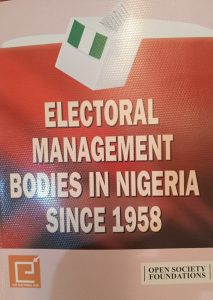
The book provoking the big question!
The foregone clears the way for the epistemic elephant in the room who combines epistemic authority with the advantage of age and of having been an insider in election management. He is Prof Adele Jinadu who reviewed the book. We would start with three quotations considered all-round striking about the book and the subject matter. A reportorial take will follow.
“I deliberately and pointedly describe the monograph as fascinating because it admirably provides, through diachronic analysis, a bird’s eye overview of the evolution of electoral commissions in Nigeria since 1958, divided into the following historical sequences: (a)1958-1960; (b) 1960-1963; (c) 1961-1966; (d)1976-1983; (1987-1983; (f) 1995-1988; and (g)1998 to date”
“Since the publication of Professor Tekena Tamuno’s, no other publication, as far as my own research has revealed, has attempted to cover with such historical sweep, the type of detailed, informed bird’s eye view, even if fleeting and tantalizingly annoying, using diachronic analysis, to range over the history of electoral commissions in Nigeria from 1923 to the present time”
“A major contradiction of the system was that it was manipulated by the colonial administration to violate a basic prerequisite of one of the theoretical foundations of competitive party and electoral politics under the Westminster-type system of parliamentary democracy: the impartial administration of elections in creating a level playing ground to ensure the ex-ante indeterminacy of such elections”
Of this three quotations, only the last requires further situatedness. Prof Jinadu anticipated that and rose to the challenge by adding that the manipulation of that election is the foundation of the political culture of zero-sum competitive politics in Nigeria today because “It was aggravated by the first-past-the-post-winner-takes-all electoral system that underpinned it, and the use of the resources of the state at both federal and /regional state for corrupt enrichment and the building of financial war chests for suborning the electoral process”.
The experience provoked efforts since then to design a framework for the impartial administration of elections, a task which privileged the obsession with electoral commission that could be said to be independent although what the adjective “independent” denote remains unclear. For him, the question of what ‘independent’ denotes is to be sought in a major development in the history of electoral administration that the text being presented describes, but which is generally not viewed as a major milestone in that history. The milestone he refers to is the recognition in 1989 of the country’ National Election Commission, established in August 1987, as a “scheduled organization” under the country’s Pensions Act. It fits the bill of a milestone because “it involved making a distinction between the commission as a corporate entity with its own legal status and the Electoral Commissioners who are political appointees with fixed term tenure.” Subsequently, electoral commissions in the country could recruit its own cadres of staff, promote, deploy, discipline, deploy and thereby secure the loyalty of its staff members.
Yet, no amount of independence would unhook the country’s electoral commissions from a two-fold impact of the country’s the federal structure. The first of the impacts is the question of separate electoral commissions for the federal and the state while the second is the composition of electoral management bodies along the ethno-regional character of the nation. The first is why a separate federal electoral commission for only the conduct of federal elections and a regional electoral body to conduct regional and local government elections was the case between 1960 and 1966 until a central electoral body for conduct of federal and state elections but a state electoral commission to conduct only local government elections between 1979 and 1983 and since 1999 while the second impact was resolved only in 1987 when the FMG bothered only about reflecting the North/South geopolitical configuration, replaced later with zonal representational on the commission.
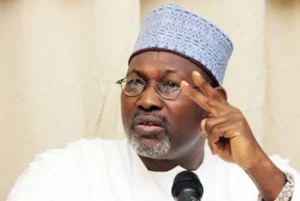
Prof Attahiru Jega, credited along with Eme Awa and Abel Guobadia with unleashing intellectual force in leading INEC
Jinadu’s contention is that as remarkable as the progress this far, especially since 2011 with the salary, emoluments of the members of the Commission becoming a first charge on the consolidated revenue fund of the Federation, “opportunities for delays and rent-seeking thrown up by the country’s budgetary and procurement processes continue to pose important limits on the extent of the financial independence of the electoral commissions.”
Additionally, he sees what he calls ponderous shackles on the independence and the ability of the country’s electoral commissions to conduct unproblematic elections from (1) the diabolic environment of the country’s competitive party and electoral politics, which in addition to the violence that typically characterizes it, has descended to the lowest depths of hate-speech and (2) the country’s massive and deepening problem of human development in the form of the huge deficits of the country’s social and physical infrastructural development.
These ‘ponderous shackles’ are his explanations for serious operational and logistics problems that continue to threaten credible elections in Nigeria in spite of the internal administrative and financial reform and the deployment of ICT to sanitize the country’s voter registrar and unwholesome practices to steal elections during the accreditation, voting and collation processes on election day, since 2011 by electoral commissions under Attahiru Jega and Mahmood Yakubu.
Playing the devil’s advocate, Jinadu says it is easy to blame the electoral commissions even as the problems persist mainly because they are inherent in the interrelated intersection of the country’s culture of diabolic politics and massive human and structural problem of underdevelopment.
He directs attention to what he considers to be two particularly worrying trends or pressing matters arising from the 2023 general elections portending danger signposts for future elections and about which there is need for public debate on the policy to contain them. Jinadu names the danger signals as impunity of abuse of the power of incumbency for partisan political party and lingering threat of the attempts by some countries or group of the donor community to unduly influence not only the conduct but also the outcomes of elections in the country. Done under the guise of democracy-promotion and electoral assistance and particular western election observation missions, under the broader theoretical framework of the responsibility to protect, he fears that “Democracy-promotion and electoral assistance, in the specific form of neoliberal, not liberal or social democracy, now seems designed to recolonize Africa and is undermining and fracturing pro-democracy civil society organizations in the country along sectarian, ethnoreligious lines, through the emergence of a labour aristocracy within them, that also serve as intelligence-gathering role for some within the donor community.”
It remains to allow Jinadu to, once more, come to us, largely in his own words on what is to be done and these are the urgent need to:
(a) develop a strong think tank or research unit within INEC which already exists in INEC’s Electoral Institute but which should be strengthened to play this role. After all, some of the milestones in the development of the country’s electoral commissions since 1958 resulted from electoral commissions headed by leadership that brought transformative intellectual power to bear on their mandate (from Eme Awa (1987-1989) to Abel Guobadia (2005-2010), Attahiru Jega (2010-2015); and Mahmood Yakubu (2015-present),
(b) resuscitate the pro-democracy coalition in state and society for electoral reform between 1993 and 2007 that targeted at party reform to make for a more responsible and accountable party system and recreate it to add to its advocacy and democracy role sustained activist campaign to push for compliance with the provisions of chapter II of the country’s Constitution; and (c) expand the notion of mandate protection beyond protection of the vote.
Prof Jinadu and nearly all others came from such a solid structuralist angle as to have ignited the hesitant constructivism in an Okey Ibeanu to smartly ponder on why no one was thinking of the agency dimension. Interestingly, Ibeanu was the only other professor in the room not named when Jinadu listed his ‘disciples’. So, Ibeanu started on a rib-cracking note that sent everyone laughing hilariously. Wondering where he belonged, considering that there are disciples and there are apostles in Christianity – Ibeanu opted to do a footnote to all he had heard throughout the session. His footnote was his stress on going beyond the structural analysis of EMBs to the agency dimension and what that could unveil. Again, who knows if Ibeanu’s insistence on applying the structure-agency debate may not be the resolution of the tension surrounding Electoral Management Bodies in Nigeria Since 1958. The tension as captured somewhere else is in the need to study what exists or has existed and the danger of reproducing it by doing so.

